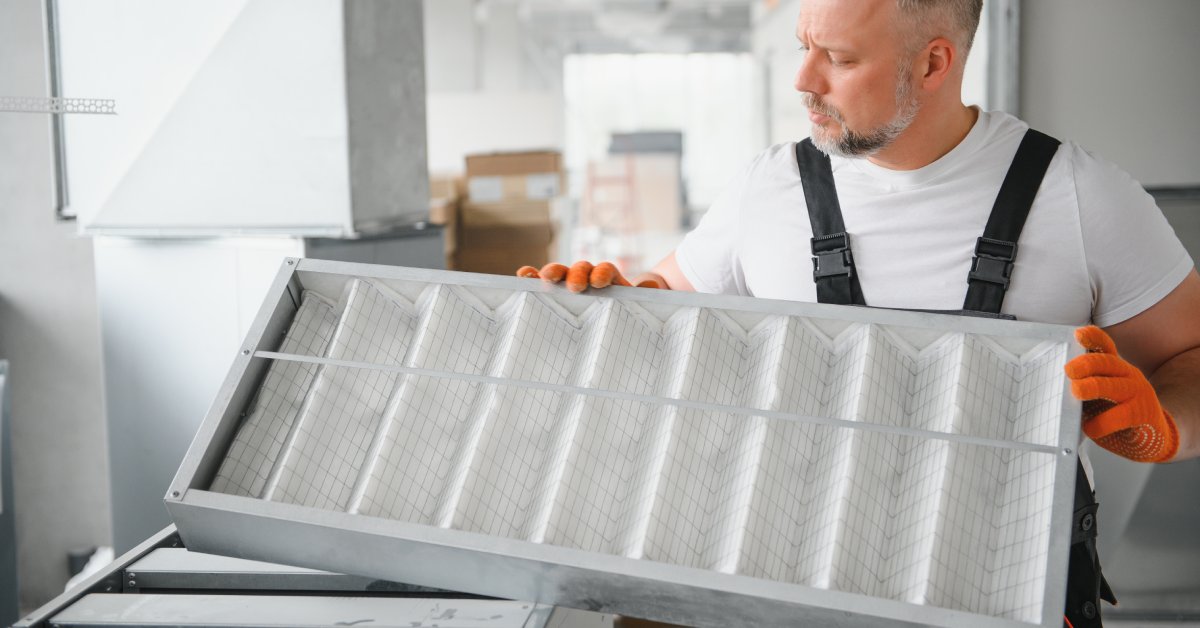The quality of the air we breathe has a direct impact on our health and productivity, yet it’s often overlooked in the workplace. Many business owners focus on visible safety measures, like clear walkways and ergonomic furniture, but the invisible threats floating in the air are equally important.
Ensuring clean air through effective filtration is a fundamental aspect of creating a safe, healthy, and productive environment for everyone. This post will explore why air filtration is critical for workplace safety and how you can implement the right solutions for your business.
Air Quality in the Workplace
The air inside a commercial or industrial facility can be more polluted than the air outside. Various activities and materials contribute to this contamination, creating a mix of airborne particles and gases that can pose serious health risks. Understanding these pollutants and their origins is the first step toward improving indoor air quality.
Common Pollutants and Their Sources
Workplaces are hubs of activity, and many of these activities release contaminants into the air. In office settings, common pollutants include dust, mold spores from damp areas, and volatile organic compounds (VOCs) released from cleaning supplies, furniture, and office equipment like printers.
In industrial environments, the sources are more pronounced. Manufacturing processes can release chemical fumes, metal dust, and other hazardous particulates. Warehouses might struggle with vehicle exhaust from forklifts and dust from packaging materials.
Even seemingly benign environments like commercial kitchens produce grease vapor and smoke. These pollutants, if left unchecked, accumulate indoors, creating an unhealthy environment for employees.
Health Risks of Poor Air Quality
Exposure to poor indoor air quality can lead to a range of health issues, from short-term discomfort to long-term chronic conditions. In the short term, employees may experience symptoms like headaches, dizziness, fatigue, and irritation of the eyes, nose, and throat. These symptoms can negatively affect an individual’s ability to concentrate and perform their duties effectively.
Long-term exposure can have more severe consequences. Airborne irritants can trigger or worsen respiratory conditions like asthma. Prolonged inhalation of certain chemicals or fine particulate matter can lead to serious diseases, like chronic respiratory illnesses or cancer. The cumulative effect of breathing contaminated air day after day puts a strain on the body’s natural defense systems, making employees more susceptible to illness and compromising their well-being.
The Role of Air Filtration Systems
Air filtration systems are the primary defense against indoor air pollution. They work by capturing and removing harmful particles and gases from the air, circulating cleaner, healthier air back into the workspace. Different types of filters target various pollutants for the most effective results.
Types of Air Filters
There are several types of air filters, each with unique capabilities. According to the U.S. Environmental Protection Agency (EPA), high-efficiency particulate air (HEPA) filters capture at least 99.97% of airborne particles, including dust, pollen, mold, and bacteria.
Activated carbon filters are another popular choice, particularly for removing gases, odors, and VOCs. These filters use a bed of activated carbon to absorb chemical pollutants from the air.
Other types of filters, like electrostatic precipitators, use an electrical charge to trap particles. The right choice of filter depends on the specific contaminants present in the workplace.
How Air Filtration Systems Work
An air filtration system typically works by drawing indoor air through a series of filters. A fan pulls the air into the unit, where it passes through one or more filters designed to capture different types of pollutants.
The first filter might be a pre-filter that catches larger particles like dust and hair, which helps extend the life of the more advanced filters. The air then moves through fine filters, such as a HEPA and activated carbon filter, to remove minuscule particles and gases.
Once the air is clean, the filtration system recirculates the air into the room. This continuous process greatly reduces the concentration of airborne contaminants, creating a much healthier breathing environment.
Benefits of Effective Air Filtration
Investing in a quality air filtration system offers numerous benefits that extend beyond simply cleaning the air. It’s an investment in the health of your employees, the productivity of your business, and your compliance with safety standards.
Protecting Employee Health
The most direct benefit of air filtration is the protection of employee health. By removing harmful pollutants from the air, you reduce the risk of both short-term and long-term health problems. A cleaner work environment means fewer employees suffering from allergies, asthma, and other respiratory issues. This commitment to health shows employees that their well-being is a priority, which can boost morale and create a more positive company culture.
Improving Productivity
Clean air also has a tangible impact on business performance. When employees breathe cleaner air, they feel better and can concentrate more effectively. Improved indoor air quality can increase cognitive function, leading to higher productivity and fewer errors.
Furthermore, a healthier workforce means fewer sick days. By reducing the spread of airborne illnesses and minimizing exposure to irritants, you can decrease absenteeism. This will make sure your team consistently works at full strength.
Complying With Regulations
Many industries are subject to regulations regarding indoor air quality and workplace safety. These standards are in place to protect workers from hazardous conditions. Implementing an effective air filtration system helps ensure that your facility meets or exceeds these requirements, protecting you from potential fines and legal issues. Maintaining compliance demonstrates a commitment to responsible business practices and helps build a reputation as a safe and desirable place to work.
Choosing the Right System
Selecting the appropriate air filtration system is crucial for achieving the desired results. Base the decision on a careful assessment of your specific needs, including the size of your facility, the types of pollutants present, and your budget.
It’s beneficial to consult with air quality professionals who can provide expert guidance and recommend a solution tailored to your unique circumstances. They can help you identify the most effective types of filters and the right system capacity to ensure optimal performance and a safe working environment.
Invest in a Safer Workplace
Air filtration is a critical component of a comprehensive workplace safety strategy. By actively managing the quality of the air your employees breathe, you are investing in their health, your company’s productivity, and your long-term success. A proactive approach to air quality protects your team from invisible threats and fosters a culture of safety and care.
At Clean Air Filters, we understand the importance of clean air in industrial environments. As a clean air filter company, we offer a range of industrial replacement filters and provide environmentally friendly filter cleaning services to help businesses maintain a safe and healthy workplace. Taking steps to improve your air filtration is a powerful way to enhance safety and demonstrate your commitment to your employees’ well-being. Learn more about our air filter services today.



